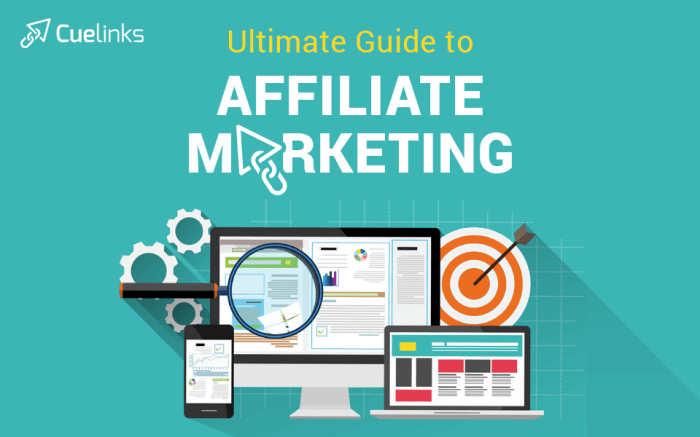Affiliate Marketing Guide: Ready to dive into the world of affiliate marketing? Get ready for a wild ride filled with strategies, tips, and secrets to help you succeed in the online business game.
In this guide, we’ll explore everything from setting up an affiliate program to finding profitable products and promoting them effectively. So, buckle up and get ready to take your online business to the next level!
Introduction to Affiliate Marketing: Affiliate Marketing Guide
Affiliate marketing is a type of performance-based marketing where a business rewards one or more affiliates for each visitor or customer brought by the affiliate’s marketing efforts. This is a popular strategy used by companies to drive sales and increase brand awareness.
Key Concepts of Affiliate Marketing
- Affiliate: The individual or company promoting the products or services of another in exchange for a commission.
- Merchant: The business that offers products or services for promotion by affiliates.
- Commission: The payment affiliates receive for each successful sale, lead, or customer referral.
Benefits of Affiliate Marketing for Businesses
- Cost-effective: Businesses only pay for actual results, such as sales or leads generated by affiliates.
- Increased reach: Affiliates help businesses reach a wider audience, potentially leading to more sales.
- Enhanced credibility: Positive reviews and recommendations from affiliates can build trust with consumers.
How Affiliate Marketing Works in the Digital Space
Affiliate marketing in the digital space involves the use of tracking links, cookies, and unique promo codes to track the performance of affiliates. When a customer clicks on an affiliate link and makes a purchase, the affiliate receives a commission. This process allows businesses to monitor the effectiveness of their affiliate marketing campaigns and optimize for better results.
Setting Up an Affiliate Marketing Program
When it comes to setting up an affiliate marketing program, there are several key steps involved in the process. From creating a solid foundation to selecting the right affiliate partners, each step plays a crucial role in the success of your program.
Criteria for Selecting Affiliate Partners
Choosing the right affiliate partners is essential for the success of your program. Here are some criteria to consider when selecting affiliates:
- Relevance: Ensure that the affiliate’s audience aligns with your target market to maximize conversions.
- Quality: Look for affiliates with a good reputation and high-quality content to maintain your brand’s image.
- Reach: Consider affiliates with a large and engaged audience to increase exposure for your products or services.
- Performance: Evaluate past performance metrics to select affiliates with a track record of driving sales and conversions.
Different Commission Structures in Affiliate Marketing
There are various commission structures used in affiliate marketing to compensate affiliates for their efforts. Here are some common types:
- Pay-Per-Sale (PPS): Affiliates earn a commission for each sale generated through their referral link.
- Pay-Per-Lead (PPL): Affiliates receive a commission for each lead they send to the merchant, such as a form submission or sign-up.
- Pay-Per-Click (PPC): Affiliates are paid based on the number of clicks generated by their referral link, regardless of whether a sale is made.
- Revenue Share: Affiliates earn a percentage of the revenue generated from the sales they refer, providing a long-term passive income stream.
Finding Profitable Affiliate Products

Finding profitable affiliate products is essential for success in affiliate marketing. Here are some tips on how to research and identify the best products to promote to your audience.
Researching Profitable Products
- Look for products with high demand in the market
- Check the commission rates offered by different affiliate programs
- Read reviews and feedback from other affiliates promoting the products
Comparing Affiliate Networks
- Consider popular affiliate networks like Amazon Associates, ClickBank, and ShareASale
- Look for networks that offer a wide range of products in your niche
- Compare the payment terms and conditions of different networks
Choosing Relevant Products
- Understand your audience’s needs and preferences
- Select products that align with your content and brand
- Avoid promoting products that are not relevant to your target audience
Promoting Affiliate Products

When it comes to promoting affiliate products effectively, there are several strategies you can employ to maximize your earnings. Content marketing plays a crucial role in affiliate promotion, helping you establish trust with your audience and drive conversions. It is also essential to disclose your affiliate relationships transparently to maintain credibility and build a loyal following.
Utilizing Social Media
- Share affiliate links on your social media platforms, providing valuable content alongside them to engage your followers.
- Create visually appealing posts that highlight the benefits of the products you are promoting to attract more attention.
- Utilize social media advertising to reach a larger audience and drive traffic to your affiliate links.
Implementing Strategies
- Optimize your website and content for relevant s to improve your search engine rankings and attract organic traffic.
- Create high-quality, informative content that incorporates your affiliate links naturally to provide value to your readers.
- Build backlinks to your content from reputable sites to increase your website’s authority and visibility.
Utilizing Email Marketing
- Build an email list of subscribers who are interested in your niche and send them targeted campaigns promoting affiliate products.
- Create compelling email content that showcases the benefits of the products and includes clear calls-to-action to encourage conversions.
- A/B test your email campaigns to optimize your strategies and improve your conversion rates over time.
Remember to always provide value to your audience and be transparent about your affiliate relationships to maintain trust and credibility.
Tracking and Optimizing Affiliate Campaigns
Tracking performance metrics and optimizing affiliate campaigns are crucial aspects of successful affiliate marketing. By monitoring and analyzing data, affiliate marketers can make informed decisions to improve the effectiveness of their campaigns and maximize their earnings.
Importance of Tracking Performance Metrics
- Tracking performance metrics allows affiliate marketers to measure the success of their campaigns and identify areas for improvement.
- By tracking key performance indicators such as click-through rates, conversion rates, and average order value, marketers can gain valuable insights into the performance of their affiliate campaigns.
- Tracking performance metrics also helps marketers understand their target audience better and tailor their campaigns to meet their needs and preferences.
Analyzing Data and Optimizing Affiliate Campaigns
- Analyzing data from tracking tools and affiliate networks can help marketers identify trends, patterns, and opportunities for optimization.
- Optimizing affiliate campaigns involves making strategic adjustments based on data analysis to improve performance and increase conversions.
- Split testing different ad creatives, landing pages, and promotional strategies can help marketers determine which approaches are most effective and optimize their campaigns accordingly.
Tools and Software for Tracking and Optimizing Affiliate Campaigns
- Popular tracking tools like Google Analytics, ClickMagick, and Voluum provide comprehensive data tracking and analysis capabilities for affiliate marketers.
- Affiliate networks often offer built-in tracking tools and reporting dashboards to help marketers monitor the performance of their campaigns.
- Conversion rate optimization tools like Optimizely and Unbounce can help marketers test and optimize their landing pages for better results.
Compliance and Legal Aspects in Affiliate Marketing
Affiliate marketers need to be aware of various legal requirements and regulations to ensure they operate within the boundaries of the law. Failure to comply with these regulations can result in penalties and damage to their reputation.
Importance of FTC Guidelines and Disclosures
- Affiliate marketers must disclose their relationship with the products or services they promote to maintain transparency and build trust with their audience.
- The Federal Trade Commission (FTC) requires affiliate marketers to clearly disclose their affiliate links and any compensation received for promoting products.
- Failing to disclose affiliate relationships can lead to legal consequences and tarnish the reputation of the marketer.
Ensuring Compliance with Privacy and Data Protection Laws, Affiliate Marketing Guide
- Affiliate marketers must comply with privacy laws such as the General Data Protection Regulation (GDPR) in the European Union and the California Consumer Privacy Act (CCPA) in the United States.
- Marketers should obtain explicit consent before collecting any personal data from users and ensure that data is stored securely and used responsibly.
- Regularly reviewing and updating privacy policies and practices is essential to ensure compliance with evolving data protection laws.
